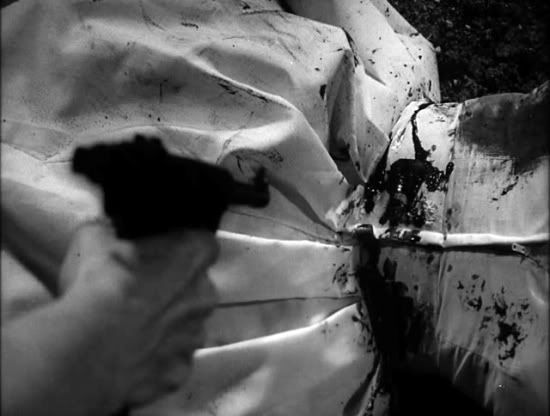 |
| "F" is for ... |
To continue to catching up, I moved on to Lars von Trier and on this film, namely
Europa (orig.
Zentropa), I refer you to
an earlier post.
As far as the next selection,
I.O.U.S.A. goes, it's a documentary (or exposé of sorts) that follows a couple of guys — one, a former executive at the Federal Budget Office, and another who currently runs a political awareness group which focuses on governmental budget issues. In this case the rampant over-obligating the United States has done over the past 60+ years. The F.B.O. guy was appointed by Bill Clinton and was fairly successful in that office, and the other guy is
apolitical in the sense that he's just some
joe who is understandably concerned that the U.S. financial system is not only headed for trouble, but has been heading toward said hurt for some time — regardless of how often and how emphatically some have pointed this out. It's really a non-bias doc and generally sticks to just the numbers, skewering most every administration going back to Abe Lincoln (or there abouts). I definitely recommended it and it also should probably be required viewing in public schools.
Now I finally saw the other two Michael Haneke films I had on my To See list — those being his adaptation of
Franz Kafka's
The Castle, and the equally enigmatic (or somewhat so)
Le Temps du Loup, or
Time of the Wolf. The Castle is expertly performed as Haneke films are wont to be, but it's ever so dry; devoid of almost all real drama or distress (usually attributable to his films) until the very ending. If you've read the book, skip the next couple sentences. In
The Castle, a nondescript man wanders into a bureaucratic
Wonderland while trying to escape the blistering winter's cold. He discovers, through no effort on his part, that the more inflexible and demanding he is the more people seemingly strive to help him out! But all is not what it seems for our dear wanderer as he becomes a pawn in a game of his own making. Haneke film number
second concerns a family of four fleeing to a vacation home amidst an unexplored disaster which forces people out of their respective cities. The family in question arrives at their cabin but finds another family has taken up residence and are unwilling to relent. A confrontation erupts which leaves the family with little choice but to flee.
A theatrical viewing from the past two weeks was Saw contributor Marcus Dunstan's
The Collector, and there isn't a hell of a lot to say about it besides to note that I haven't been so bored at a movie since
30 Days of Night. Pass — on both screens.
Now onto something I patiently waited to arrive in Region 1 format; the simply incredible
5 Centimeters Per Second or,
5 Centimeters Per Second: a chain of short stories about their distance. It's actually three stories anastomose (thank you Langenscheidt Thesaurus!) revolving around childhood friends Takaki and Akari, who eventually move away from each other yet wind up going to great lengths to see each other again. The second and third
acts are hinged on the continued travels of Takaki, his family moving from town to town, school to school, and how he eventually meets another girl later in life. Only he becomes introverted, wayward, and a bit despondent into adulthood over his idyllic memories. It's fairly moody from afar, for a semi-romantic drama, but it is entirely approachable as the movie moves on. The animation alone is worth a viewing.
And I'm just about caught up. The last title here is Orson Welles'
F is for Fake. A genre-less doc (unless one wanted to tag it as mockumentary), Welles spins a story of an art counterfeiter named Elmyr who isn't a counterfeiter but actually is, and his immediate circle of friends and fellow confidence men (and by this I mean they hardly lack confidence) celebrate Elmyr to no end, that is, again, when he is not celebrating himself. The group waxes nostalgic over their varying triumphs; from expertly duping (
or not) Howard Hughes and Pablo Picasso (
or not) and countless unnamed art patrons — all the while living spectacularly simple yet indulgent lives. Welles is a righteous storyteller and most expert narrator as he travels between continents putting on his show not only for us, the audience, but for anyone who seems willing to imbibe, nosh, or contribute to Orson's grandiose tale. Highly recommended.








